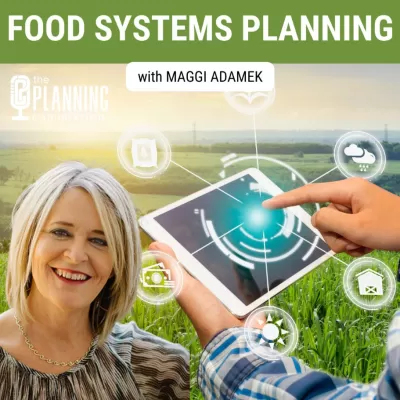Food systems expert Maggi Adamek talks with The Planning Commission Podcast about the complexities of food policy, from local zoning ordinances to international trade agreements.

You’ve probably heard of missing middle housing. But have you heard of missing middle farming?
That’s what food systems expert Maggi Adamek of Minneapolis-based Terra Soma wants planners to consider as they work to create healthier communities. In this episode of The Planning Commission Podcast, Adamek discusses the ways in which food systems and farming dramatically changed after World War II to make growing food more efficient and preparing food more convenient.
This is when the United States moved away from localized food production. Instead, food markets were pushed to the edges, dominated on one end by industrial farming with small-scale, rural, and community food systems intact but unable to feed urbanized population clusters. Thus, missing middle farming.
“Ag policy from the Nixon Administration moved farmers away from producing things that people would eat to growing things like corn and soybeans used for biofuels and feeding livestock,” Adamek said. “You would really have to hunt to get a healthy option outside of your own home. It got to the point where obesity and related dietary diseases rates proliferated.”
That’s when the planning profession started to hear the cry from health professionals. “The planning community, as a whole, really felt a call to action around embedding thinking about access and healthy eating as core components to community design,” Adamek shared.
Planners began asking questions like: How are people going to have access to a grocery store? How are we going to support our farmers’ markets? How do we plan and zone for community gardening space? How do we support the kinds of positive activity that will improve people’s access to affordable healthy food?
These planning approaches, as well as the external influences on food production and food distribution, are discussed throughout the episode.
The Planning Commission is a spirited debate by planners, for planners. This independent outlet for all things planning explores the serious and lighter sides of the profession, poses probing and creative questions to guests, and always pairs the episode guest and topic with a choice libation. Listen to the podcast for a special offer from Planetizen.
FULL STORY: Season 2 Episode 16 Food Systems Planning

Alabama: Trump Terminates Settlements for Black Communities Harmed By Raw Sewage
Trump deemed the landmark civil rights agreement “illegal DEI and environmental justice policy.”

Study: Maui’s Plan to Convert Vacation Rentals to Long-Term Housing Could Cause Nearly $1 Billion Economic Loss
The plan would reduce visitor accommodation by 25% resulting in 1,900 jobs lost.

Why Should We Subsidize Public Transportation?
Many public transit agencies face financial stress due to rising costs, declining fare revenue, and declining subsidies. Transit advocates must provide a strong business case for increasing public transit funding.

Wind Energy on the Rise Despite Federal Policy Reversal
The Trump administration is revoking federal support for renewable energy, but demand for new projects continues unabated.

Passengers Flock to Caltrain After Electrification
The new electric trains are running faster and more reliably, leading to strong ridership growth on the Bay Area rail system.

Texas Churches Rally Behind ‘Yes in God’s Back Yard’ Legislation
Religious leaders want the state to reduce zoning regulations to streamline leasing church-owned land to housing developers.
Urban Design for Planners 1: Software Tools
This six-course series explores essential urban design concepts using open source software and equips planners with the tools they need to participate fully in the urban design process.
Planning for Universal Design
Learn the tools for implementing Universal Design in planning regulations.
Caltrans
Smith Gee Studio
Institute for Housing and Urban Development Studies (IHS)
City of Grandview
Harvard GSD Executive Education
Toledo-Lucas County Plan Commissions
Salt Lake City
NYU Wagner Graduate School of Public Service





























